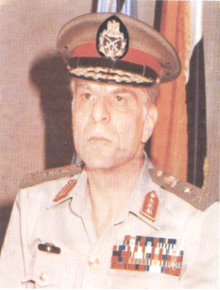Ibrahim El-Orabi
This article has multiple issues. Please help improve it or discuss these issues on the talk page. (Learn how and when to remove these messages)
|
Ibrahim El Orabi | |
|---|---|
 | |
| Birth name | Ibrahim Abdel Ghafour El Orabi |
| Nickname(s) | "El Fareeq El Orabi" |
| Born | 20 May 1931 El-Gharbeyya, Kingdom of Egypt |
| Died | 18 September 2019 (aged 88) Al-Qahira, Egypt |
| Allegiance | |
| Service | |
| Years of service | 1950–1987 |
| Rank | |
| Commands | Chief of the General Staff Chief of Operations of the Armed Forces Commander of the Second Field Army Commander of the 21st Armored Division Commander of the Arab Forces in Iraq Commander of the Armored Corps in Yemen war |
| Battles / wars | |
| Awards |
|
Ibrahim Abdul Ghafour El Orabi (Arabic: إبراهيم عبد الغفور العرابي, Arabic: [ˈʔɪbrahiːm ʕæbdel ˈɣafuːɾ el ʕoɾæːbi]); 20 May 1931 – 18 September 2019) was an Egyptian Army Lieutenant General and the 13th former Chief of Staff of the Egyptian Armed Forces.
Ibrahim El-Orabi was a member of the Free Officers Movement, as defined by the Egyptian revolution of 1952. He served as the 13th Chief of Operations of the Armed Forces, the commander of the Second Field Army, commander of the 21st Armoured Division, Commander of the Arab Forces in Iraq, and as the commander of the Egyptian Armoured Corps, which was deployed in the North Yemen Civil War.
As the chief of staff of the Egyptian Armed Forces, Orabi was the second highest-ranking military officer in all of the Egyptian Armed Forces.
Early life
[edit]Orabi was born in Gharbia in 1931 into a politically influential family. He was the relative of Ali Zaki El Orabi Pasha, former Minister of Public Knowledge and Minister of Transportation and Communications and head of the Parliament of Egypt in the period (7 May 1942 – 19 Dec 1944) and (17 June 1950 – 10 Dec 1952) during the reign of King Farouk I of Egypt, and brother of Nabil El Orabi, former Egypt ambassador to the Russian Federation, and the relative of Mohamed Orabi, former Minister of Foreign Affairs of Egypt.
Education
[edit]Orabi received a Bachelor of Military Science from the Egyptian Military Academy in 1950, Master of Science from M. V. Frunze Military Academy in Moscow, and a Master of Science from the College of Military Commanders and Staff, as well as a PhD in military science from Nasser Military Academy, Fellow of the Higher War College.
Personal life
[edit]Orabi had three children with his wife Leila: Khadija, Khaled, and Tarek. The sons served in the Egyptian General Intelligence and Tarek remains on active duty. Orabi and his wife have nine grandchildren.
Military education
[edit]- 1950 Bachelor of Military Science degree, Egyptian Military Academy, Heliopolis, Cairo
- 1961 Master of Military Art and Science degree, M.V. Frunze Military Academy, Moscow, Soviet Union
- 1972 PhD of Military Science, Joint Command and Staff College, Cairo, Egypt
- 1977 Fellowship of the Higher War College, Nasser's Military Sciences Academy, Egypt
Dates of rank
[edit]| Rank | Date |
|---|---|
| 1950 | |
| Never held | |
| 1977 | |
| 1983 |
Career
[edit]In 1950, Orabi began his service in the Armored Corps, then he joined the Free Officers Movement and participated in the Egyptian Revolution of 1952.
From 1963 to 1967, Orabi served as Commander of the Arab Forces in Iraq and Commander of the Armored Corps in Yemen war and then was appointed to the Field Marshal's Office.
In the year of 1968, Orabi was dispatched on an training branch. He then assumed the position of vice president of operations of the second field army, and shortly after that, he was appointed commander of the 21st armoured division.
From 1977 to 1981, Orabi was promoted to the rank of Major General and was appointed Assistant Commander of the Second Field Army. He next served in the Second Field Army, where he was assigned Chief of Staff, and then as Commander of the Second Field Army.
On 4 March 1981, General Orabi was nominated by President Anwar Sadat to serve as chief of operations of the Armed Forces. He was next appointed Assistant Minister of Defence in 1982.
On 16 July 1983, President Hosni Mubarak nominated Orabi to be the Chief of the General Staff, and he was promoted to the rank of lieutenant general. He has been confirmed by the Supreme Council of the Armed Forces. He took over from Army General Abd Rab El Naby Hafez on 16 July 1983. He serves with Gen. Salah Abd El Halim, former commander of the Second Field Army , who has become the next Chief of Operations of the Armed Forces.
In 1987, Orabi was appointed Chairman of the Arab Organization for Industrialization (AOI), a position he held till 1995, when he retired.
Military participations
[edit]Awards and decorations
[edit]This section may be confusing or unclear to readers. In particular, it consists of a collection of unexplained images. (September 2015) |
Orabi is the recipient of the following awards:
References
[edit]External links
[edit]- 1931 births
- 2019 deaths
- Egyptian Sunni Muslims
- Egyptian generals
- Egyptian Military Academy alumni
- Free Officers Movement (Egypt)
- Egyptian revolutionaries
- Frunze Military Academy alumni
- Egyptian people of the Yom Kippur War
- 20th-century Egyptian military personnel
- Members of the Supreme Council of the Armed Forces
- Chiefs of the General Staff (Egypt)

